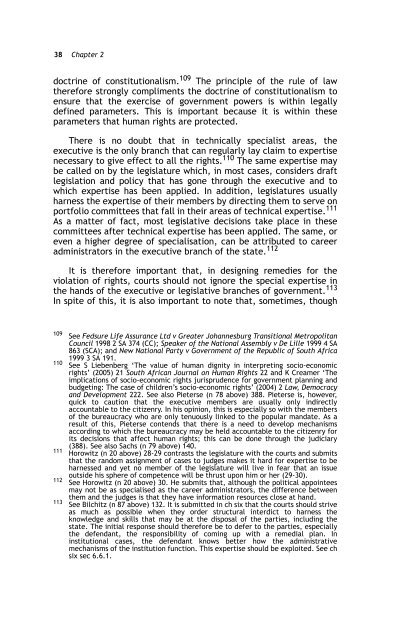LITIGATING SOCIO-ECONOMIC RIGHTS IN SOUTH AFRICA - PULP
LITIGATING SOCIO-ECONOMIC RIGHTS IN SOUTH AFRICA - PULP
LITIGATING SOCIO-ECONOMIC RIGHTS IN SOUTH AFRICA - PULP
You also want an ePaper? Increase the reach of your titles
YUMPU automatically turns print PDFs into web optimized ePapers that Google loves.
38 Chapter 2<br />
doctrine of constitutionalism. 109 The principle of the rule of law<br />
therefore strongly compliments the doctrine of constitutionalism to<br />
ensure that the exercise of government powers is within legally<br />
defined parameters. This is important because it is within these<br />
parameters that human rights are protected.<br />
There is no doubt that in technically specialist areas, the<br />
executive is the only branch that can regularly lay claim to expertise<br />
necessary to give effect to all the rights. 110 The same expertise may<br />
be called on by the legislature which, in most cases, considers draft<br />
legislation and policy that has gone through the executive and to<br />
which expertise has been applied. In addition, legislatures usually<br />
harness the expertise of their members by directing them to serve on<br />
portfolio committees that fall in their areas of technical expertise. 111<br />
As a matter of fact, most legislative decisions take place in these<br />
committees after technical expertise has been applied. The same, or<br />
even a higher degree of specialisation, can be attributed to career<br />
administrators in the executive branch of the state. 112<br />
It is therefore important that, in designing remedies for the<br />
violation of rights, courts should not ignore the special expertise in<br />
the hands of the executive or legislative branches of government. 113<br />
In spite of this, it is also important to note that, sometimes, though<br />
109<br />
See Fedsure Life Assurance Ltd v Greater Johannesburg Transitional Metropolitan<br />
Council 1998 2 SA 374 (CC); Speaker of the National Assembly v De Lille 1999 4 SA<br />
863 (SCA); and New National Party v Government of the Republic of South Africa<br />
1999 3 SA 191.<br />
110 See S Liebenberg ‘The value of human dignity in interpreting socio-economic<br />
rights’ (2005) 21 South African Journal on Human Rights 22 and K Creamer ‘The<br />
implications of socio-economic rights jurisprudence for government planning and<br />
budgeting: The case of children’s socio-economic rights’ (2004) 2 Law, Democracy<br />
and Development 222. See also Pieterse (n 78 above) 388. Pieterse is, however,<br />
quick to caution that the executive members are usually only indirectly<br />
accountable to the citizenry. In his opinion, this is especially so with the members<br />
of the bureaucracy who are only tenuously linked to the popular mandate. As a<br />
result of this, Pieterse contends that there is a need to develop mechanisms<br />
according to which the bureaucracy may be held accountable to the citizenry for<br />
its decisions that affect human rights; this can be done through the judiciary<br />
(388). See also Sachs (n 79 above) 140.<br />
111 Horowitz (n 20 above) 28-29 contrasts the legislature with the courts and submits<br />
that the random assignment of cases to judges makes it hard for expertise to be<br />
harnessed and yet no member of the legislature will live in fear that an issue<br />
outside his sphere of competence will be thrust upon him or her (29-30).<br />
112<br />
See Horowitz (n 20 above) 30. He submits that, although the political appointees<br />
may not be as specialised as the career administrators, the difference between<br />
them and the judges is that they have information resources close at hand.<br />
113<br />
See Bilchitz (n 87 above) 132. It is submitted in ch six that the courts should strive<br />
as much as possible when they order structural interdict to harness the<br />
knowledge and skills that may be at the disposal of the parties, including the<br />
state. The initial response should therefore be to defer to the parties, especially<br />
the defendant, the responsibility of coming up with a remedial plan. In<br />
institutional cases, the defendant knows better how the administrative<br />
mechanisms of the institution function. This expertise should be exploited. See ch<br />
six sec 6.6.1.
















